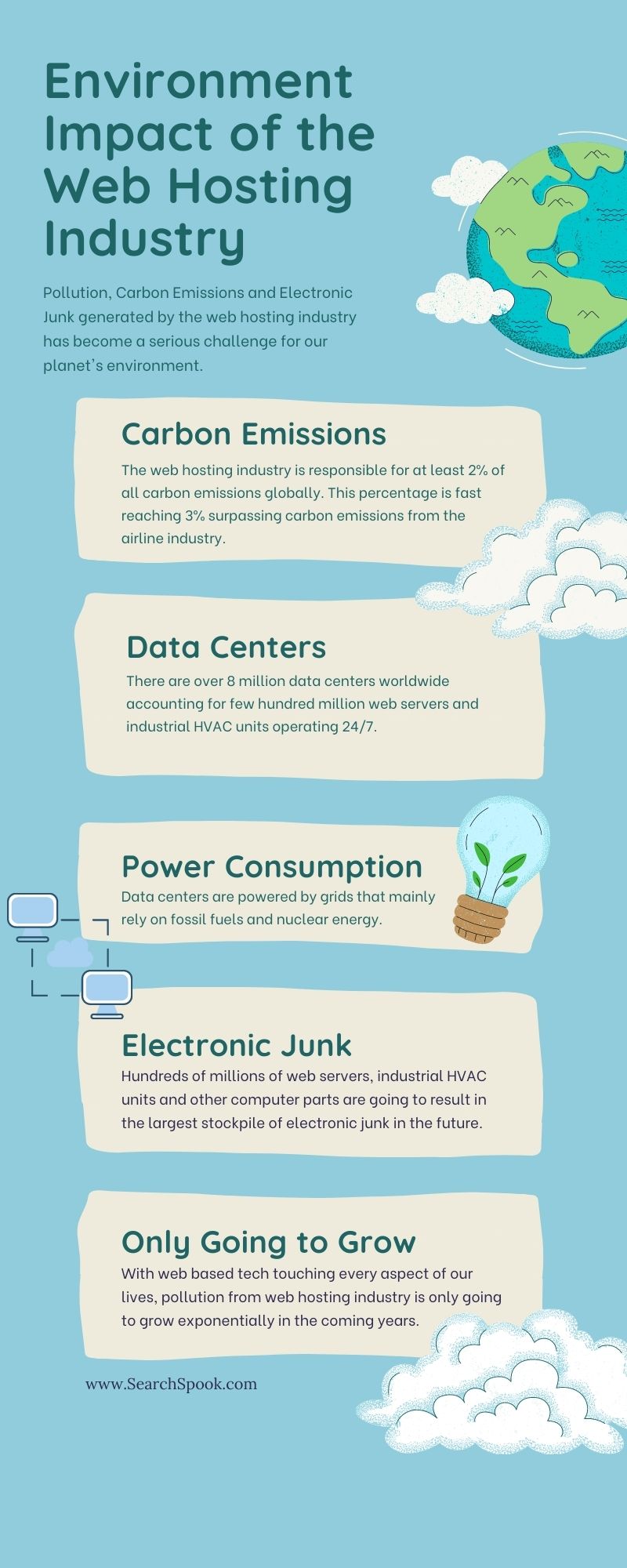When it comes to carbon emissions and the most polluting industries of the world, the usual suspects such as transportation, energy production and manufacturing come to mind.
However, there is one industry that has gone under the radar but in reality, has one of the highest carbon emissions for any industry across the globe. In fact, this industry as per some estimates, will become the highest polluting industry on earth in the coming few decades. Given the title of this article, I am assuming you have already guessed, we are talking about the Web Hosting industry.
Understanding what constitutes the Web Hosting Industry
Web hosting, impacts every aspect of the internet.
Most general users cannot even comprehend how huge the industry is at the moment.
To understand web hosting, first imagine the following:
1) Every personal or company website, blog or online forum.
2) Every ecommerce platform from small online stores to the biggies such as Amazon.
3) Every OTT platform for videos such as Netflix, Disney Plus, Amazon Prime etc.
4) Every music streaming platform such as Spotify.
5) All cloud based software, applications and tools whether for smartphones or desktop use. This includes services such as Dropbox, mobile games etc.
6) Video consumption platforms such as YouTube, TikTok etc.
7) Video conferencing tools such as Zoom, Microsoft Teams, Google Meet etc.
8) All mobile apps.
9) Social media platforms such as Facebook, Instagram, Twitter, Pinterest etc.
10) Chatting and messaging tools like Whatsapp, Snapchat etc.
11) Company internal networks for data sharing, syncing and storing.
12) All email platforms such as Gmail, Hotmail etc.
Basically anything and everything to do with content on the internet whether being accessed publicly or privately.
All of these need web sever space to host the content. It is from these web servers that data get to your computers, mobiles or tablets when accessed from a browser, application or using any other means.
Now imagine the billions of gigs of data being generated by all of the above every single day. Imagine the number of web servers required to host all of this content.
Therefore there are now several hundreds of millions of web servers operating in few million data centers globally. These data centers are huge buildings that have racks of web servers stacked one after the other.
Each web server is connected to the internet backbone where billions of gigs of data is transferred every day.
Hence the web hosting industry, in the simplest terms is basically a service that provides server space to host any kind of content as listed above. This includes from small web hosting companies to the giants of cloud computing such as Amazon Web Services, Microsoft Azure, Google Cloud etc.
Remember that anything that users need to access via the internet, has to be hosted somewhere in a web server.
There are billions of websites and blogs alone. Just imagine the millions of web servers required just to host simple personal and company websites. Now imagine with cloud computing and smartphone applications growing, several million more servers are required just to host mobile apps, cloud based software, web services etc.
Thanks to the global pandemic brought about by Covid-19 in the year 2020, the shift to internet based technologies in every aspect of life has become even more rapid. Think about online schooling, office meetings over web conferencing tools, team collaboration using online software, connected technologies in cars and so on.
All this means, the web hosting industry, is now one of the fastest growing industry in the world.
Environment impact statistics of the web hosting industry
To understand the true environment cost of the entire web hosting industry, consider the following points:
1) There are few million data centers globally, accounting for few hundred million web servers. Each of those web servers are connected 24/7 to the power grid.
2) Web servers not only need to have continuous source of power without any kind of break but also need backup power sources in case of primary power failure.
3) These data centers also need to have massive cooling systems to prevent web servers from over-heating and breakdowns. Industrial HVAC units are operating 24/7 in each of these millions of data centers.
4) Thanks to all of these, the web hosting industry is responsible for at least 2% of all carbon emissions globally. To put that in perspective, that is equal to the carbon emissions from entire airline industry, although web hosting has barely touched the surface in terms of growth as per many industry watchers.
5) The 2% carbon emission statistic is from reports few years back. The actual percentage of carbon emissions by some estimate has already reached near 3%.
6) The percentage growth in carbon emissions or greenhouse gas emissions by the web hosting industry will only continue to grow at an exponential rate considering the industry itself is growing tremendously with a complete shift to internet based technologies worldwide.
As per GreenGeeks, the number of data centers have grown from 500,000 to 8 million from 2012 to 2020. While this number is already quite staggering, it is alarming to note that the numbers will potentially grow even faster in the next decade.
At this rate, web hosting could become the most polluting industry in the world pulling the most energy from power grids globally.
Unfortunately, we all know that current power grids mainly rely on fossil fuels and nuclear energy.
This means the pressure on the planet’s carbon levels will continue to rise as the web hosting industry grows further.
If all this was not bad enough, now consider what will happen when millions of these web servers need to be replaced? Is there a recycling system in place or everything goes out as electronic junk?
Remember, it is not just web servers that will need replacements in the future. HVAC units, computer parts, monitoring units etc. will all need replacements. So in the end, we will be looking at electronic junk at a level never seen before.

Why don’t we think of web hosting when thinking about carbon emissions?
Well the answer to that is simple – Out of sight, is out of mind.
That age old idiom is true in the case of web hosting and our perceptions of polluting industries.
Since the general user does not really get to see a web server or a data center, they usually do not even realize the impact of their activities on the internet.
Think about this – how many people actually feel the environment impact with each tweet or Instagram post? How many environmental activists are actively tweeting not realizing the impact of their tweets on the environment?
We just see our own smartphones, laptops or desktop machines. We don’t realize from where the data on our devices are coming from.
Till people do not understand how the internet and web content actually works, web hosting industry will go under the radar when it comes to associating it with the most polluting industries.
What can be done about carbon emissions from the web hosting industry?
Well you cannot stop the internet and technology in general from growing. It is inevitable that web based technologies will impact every aspect of our lives in the future.
However, what can be done is to try and make web hosting companies to shift to renewable energy sources for their energy requirements.
At the moment, very few web hosting service providers like GreenGeeks claim to have eco-friendly credentials but that is clearly not enough, nor is it convincing.
Things will change only if the big players of the industry make a hard shift towards renewal energy sources.
There also has to be a better way to recycle or dispose of old web servers or any machines, parts and other units that make up a data center. Without a strong recycling system, we will end up with another catastrophe when millions of servers, computer parts and machines such as HVAC units need replacement.
Final thoughts
To recap things quickly:
1) Carbon emissions from the web hosting industry have already reached 2% globally equalling that of the airline industry. However, green house gas emissions from web hosting will surpass other industries with current growth trajectory.
2) The number of data centers across the world will soon reach 10 million. Total number of web servers are already in hundreds of millions. The amount of energy required to run all of these data centers along with HVAC units required to keep internal temperatures at optimal levels will be amongst the highest of any industry.
3) With exponential growth in internet based technologies, web hosting will be amongst the fastest growing as well as biggest industries in the world. It will also potentially become the most polluting industry if nothing is done about it right now.
4) The time to act was yesterday. There is an immediate and urgent need to ensure data centers focus on shifting to renewal energy sources as much as possible.
5) Web hosting will also end up causing one of the largest piles of electronic junk in the world. We need a better recycling and reuse policy as otherwise we are looking at a potential catastrophe in the future.
Technology growth cannot be stopped. The internet will be part of every aspect of life and that is fine. What is not fine is the continued use of fossil fuels to match the energy requirements of the tech and web hosting industry. We need to put all our efforts into developing renewal energy sources. Clean energy technology should be given priority and more time and investment needs to go on that front. Basically we need to get our priorities straight. Better technology in clean energy production and distribution will help not just the web hosting industry but pretty much all other industries on our planet.





